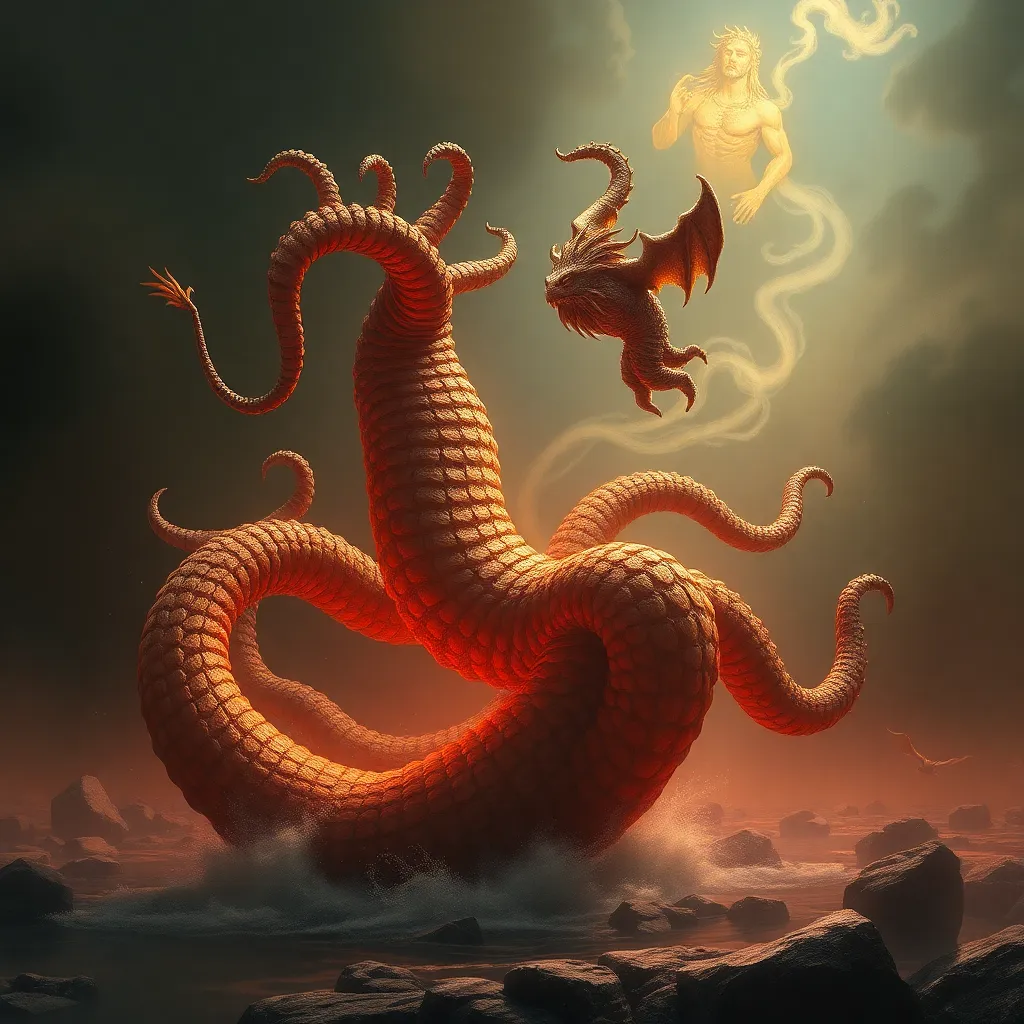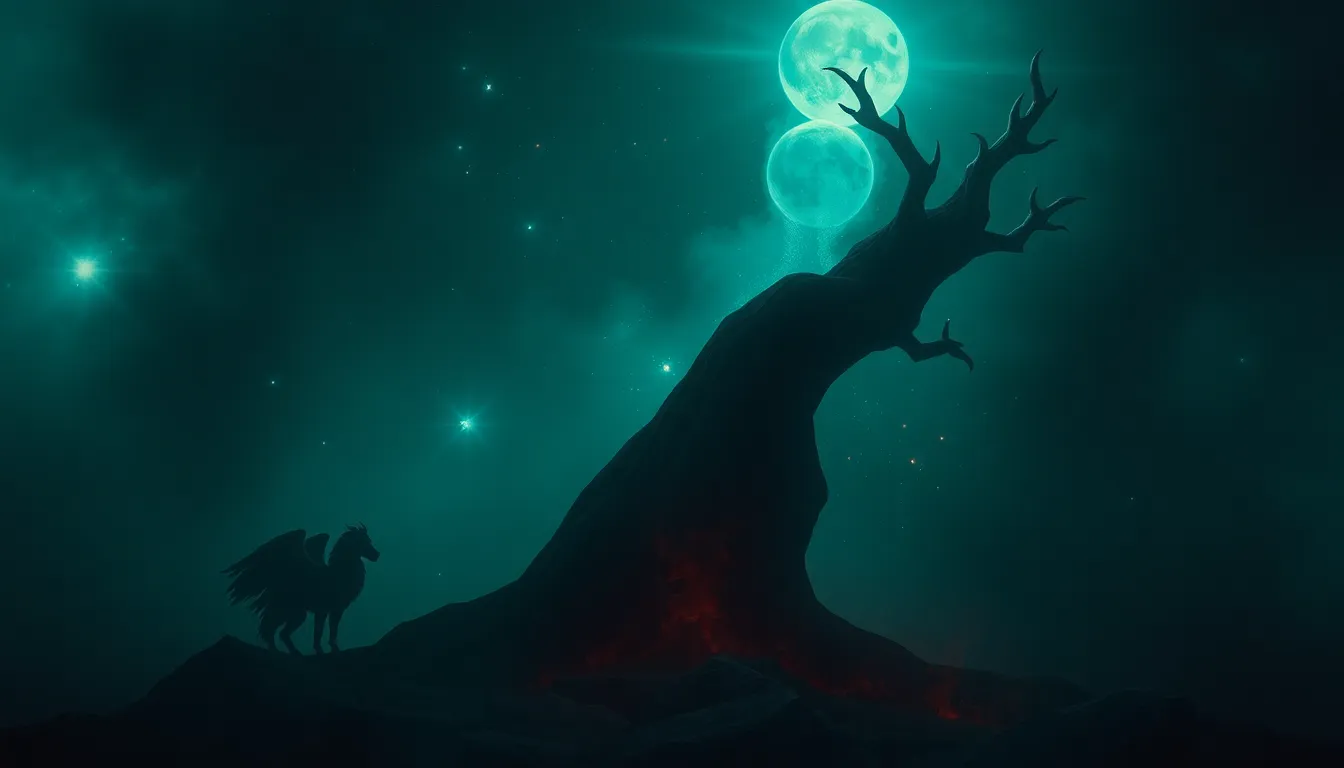The Hydra’s Curse: Unveiling the Monster’s Role in Greek Tragedy and Comedy
I. Introduction
The Hydra, a multi-headed serpent from Greek mythology, has captivated the imaginations of many throughout history. This fearsome creature is not merely a monster; it embodies complex themes and emotions that resonate across the spectrum of human experience. Monsters like the Hydra play a significant role in Greek literature, serving not only as antagonists but also as symbols of deeper human struggles.
This article aims to explore the Hydra’s dual role in both Greek tragedy and comedy, revealing how this mythical beast reflects the challenges and absurdities of life. By examining the Hydra’s origins, its portrayal in various genres, and its lasting legacy, we can gain a richer understanding of its significance in human storytelling.
II. The Myth of the Hydra
A. The Hydra’s origins are steeped in the lore of ancient Greece. Traditionally, it is said to inhabit the swamps of Lerna, where it guarded the entrance to the Underworld. According to myth, the Hydra was born from the monstrous Echidna and Typhon, making it a creature of formidable lineage.
B. The characteristics and symbolism of the Hydra are equally compelling. With its regenerative ability—growing two heads for every one that is cut off—it symbolizes the idea of insurmountable obstacles and the relentless nature of evil. The Hydra is often depicted as a creature of immense strength and terror, representing the chaos that lurks beneath the surface of life.
C. The Hydra’s encounters with heroes, particularly Heracles, are pivotal in its myth. In the second of his Twelve Labors, Heracles is tasked with slaying the Hydra. This labor signifies not just a physical battle but also a confrontation with the deeper struggles of humanity, as Heracles learns that brute strength alone cannot overcome the beast.
III. The Hydra in Greek Tragedy
A. In tragic narratives, the Hydra serves as a thematic exploration of the insurmountable challenges that characters face. The creature is often a metaphor for the seemingly endless cycle of suffering and strife, embodying the tragic flaws and fates of the protagonists.
B. The role of the Hydra as a representation of insurmountable challenges is evident in various tragic works, where characters must confront their own hydra-like struggles. These encounters often lead to a deeper understanding of their own limitations and the nature of their existence.
C. Specific tragic plays featuring the Hydra include adaptations of Heracles’ myth. In these adaptations, the Hydra becomes an emblem of fate and destiny, illustrating how the characters’ attempts to overcome their challenges can lead to further despair.
IV. The Hydra in Greek Comedy
A. In contrast to tragedy, the Hydra is often reinterpreted in comedic contexts. Here, the creature is used to highlight the absurdity of human endeavors and the folly of ambition.
B. The use of the Hydra as a source of humor and satire allows playwrights to explore human weaknesses. The monster becomes a tool for comedic relief, poking fun at the human condition and the lengths to which people will go to overcome obstacles.
C. Examples of comedic works that incorporate the Hydra include various plays from Aristophanes, where the creature is used to satirize political figures and societal norms. In these narratives, the Hydra’s absurdity serves to entertain while also critiquing the state of affairs in ancient Greece.
V. The Hydra as a Symbol of Human Struggle
A. The Hydra’s curse can be seen as a metaphor for personal and societal challenges. Just as the Hydra grows stronger with each attempt to vanquish it, so too do the struggles in our lives often seem to multiply in the face of adversity.
B. The duality of human experience is reflected in the Hydra’s story, where moments of triumph are often followed by new challenges. This cyclical nature of struggle speaks to the resilience of the human spirit, emphasizing that growth often comes from facing our hydras head-on.
C. Lessons learned from the Hydra’s encounters include the importance of perseverance and the understanding that some challenges require more than mere strength or courage to overcome.
VI. The Legacy of the Hydra in Modern Culture
A. The Hydra’s influence on contemporary literature and media is profound. This mythical creature has inspired countless adaptations, appearing in novels, films, and television series as a symbol of complexity and struggle.
B. Adaptations and reinterpretations of the Hydra in modern storytelling often reflect current societal issues, using the creature to explore themes of resilience, identity, and the nature of evil.
C. The enduring relevance of the Hydra’s curse is evident as it continues to resonate with audiences, serving as a reminder of the challenges we face in our own lives and the importance of confronting them.
VII. Comparative Analysis: Tragedy vs. Comedy
A. Key differences in how tragedy and comedy portray the Hydra highlight the versatility of this mythological figure. While tragedy emphasizes the serious and often grim aspects of struggle, comedy uses the Hydra to explore the lighter, absurd sides of human experience.
B. The role of audience perception plays a crucial part in shaping the Hydra’s narrative. In tragedy, audiences may feel empathy and sorrow for the characters, while in comedy, they might find themselves laughing at the ridiculousness of the situation.
C. The impact of genre on the interpretation of the Hydra’s curse reveals the multifaceted nature of this myth. Depending on the context, the Hydra can symbolize despair, resilience, humor, or folly, showcasing the complexity of human emotions.
VIII. Conclusion
A. In summary, the Hydra’s multifaceted role in Greek tragedy and comedy illustrates the depth of human experience. As both a representation of insurmountable challenges and a source of humor, the Hydra remains a powerful symbol in literature.
B. Reflecting on the importance of monsters in understanding human nature, we can see that these creatures often embody our fears, struggles, and aspirations. The Hydra, in particular, serves as a reminder of the complexities of life.
C. In conclusion, the Hydra’s curse endures as a significant element of storytelling, encouraging us to confront our own challenges with courage and humor, thereby enriching our understanding of the human condition.



